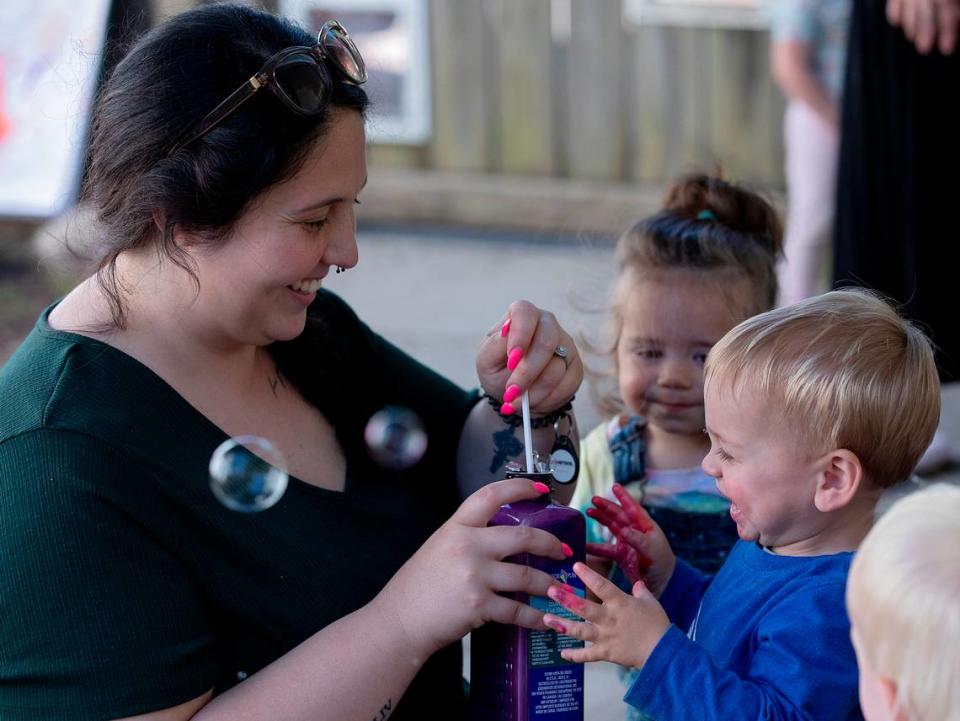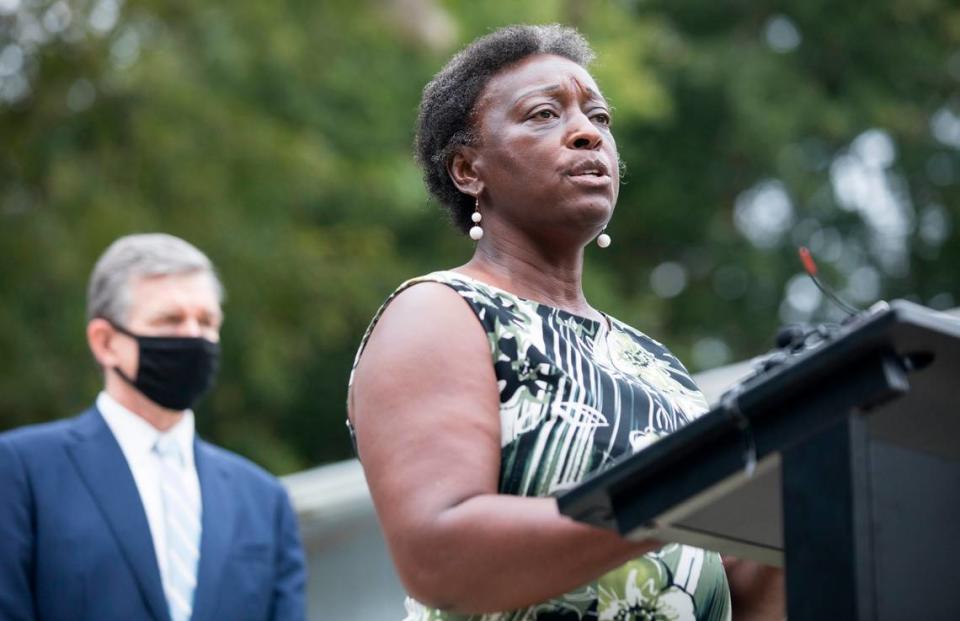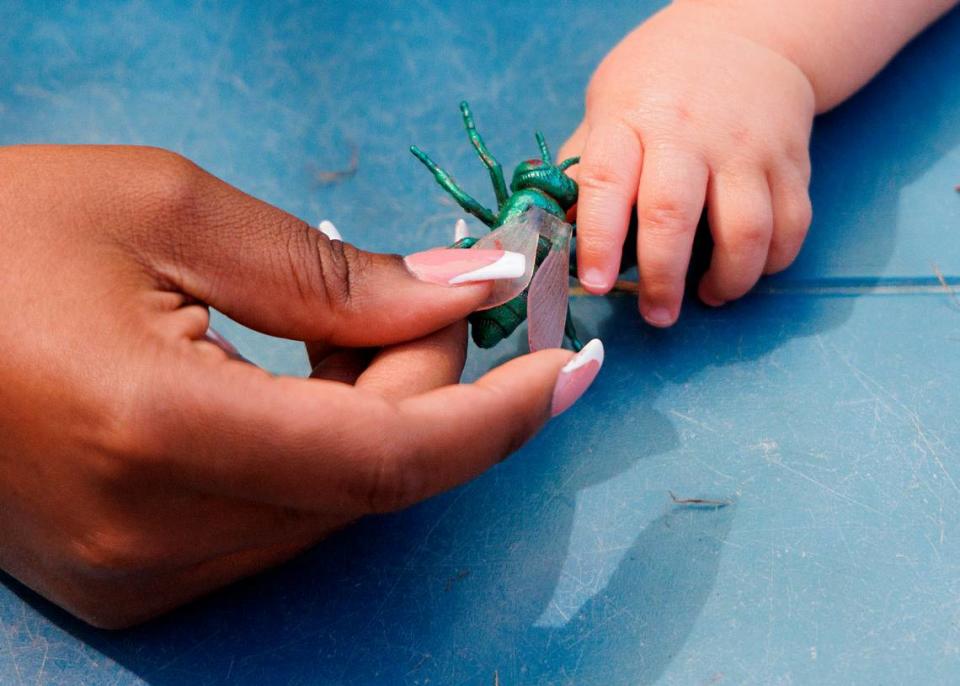Looming funding crisis could cause hundreds of NC childcare centers to close
It could get even harder for North Carolina families to find affordable daycare because of the potential closure of as many as 1,500 childcare centers.
Centers across the state are planning to close their doors or raise tuition rates to cope with the end of $1.3 billion in federal COVID aid in June. Unless Congress and/or state lawmakers take action soon to provide more money, childcare advocates warn that tens of thousands of already limited childcare seats could disappear.
“Childcare has always been an issue for the state of North Carolina,” Jennie Ogden, director of the Little School of Hillsborough, said in an interview. “But now it’s only going to be harder for parents because there will be less choices and less spots as this area grows.”

Day of action in Raleigh on May 16
The situation is so dire that some childcare advocates are calling for a “day of action” where childcare centers would close on May 16 so workers can come to Raleigh to lobby state lawmakers.
“As providers, we know it’s a big ask to close a center or a classroom for a day, but this is a big ask because we have a big problem ahead of us,” according to the Child Care for N.C. Coalition. “We have to do everything we can to make child care funding and teacher pay a priority before a looming crisis hits our child care system in June, impacting our children, families, teachers, workplaces, and communities.
“We are closing for ONE DAY so we don’t have to close centers, family child care homes, and classrooms forever in the coming months.”
It’s unclear at this point how many centers may close May 16.
COVID aid saved childcare programs
North Carolina’s 5,404 early childcare facilities enroll 221,081 children, according to state statistics.
When the pandemic hit, Congress provided stabilization grants to childcare centers across the nation to keep them afloat. State lawmakers also used some of the COVID aid to keep the grant funding going.
Nearly all of the state’s childcare facilities received stabilization grants that allowed them to pay employees, cover rent and mortgage costs, and subsidize childcare costs for some families.
Childcare workers saw raises, on average, of $2 to $3 an hour. Even with the raises, the $14 an hour median wage for childcare workers is less than what they’d get working at a business like Costco, Target or Starbucks.
Some facilities used the grant money to increase employee benefits or offer benefits for the first time.
“The stabilization grant is probably the best thing that happened to childcare in my 32 years,” Anna Mercer-McLean, director of the Community School for People Under Six in Carrboro, said in an interview. “No funding has come into the field that has supported operations like this.”

Childcare centers warn of closing
But childcare programs will reach a funding cliff in June.
A recent survey of the state’s childcare programs found 29% expect to close when the stabilization grants go away. That means 1,535 programs could close. That would take away 91,660 slots.
Families got a taste of what could come when Rhymes & Reasons, a childcare center in Rolesville, announced it was closing on May 3.
“We are bracing for not only centers closing but more people exiting the profession,” Kristi Snuggs, president of the Durham-based Child Care Services Association, said in an interview. “It will cause all kinds of ripple effects in the state’s economy.”
Fewer seats for toddlers
The loss of seats could be particularly devastating to families seeking childcare for infants and toddlers.
According to the statewide survey, 42% of childcare programs expect to reduce the number of infant and toddler seats unless the grant funding continues.
Any reductions would worsen what the North Carolina Early Education Coalition already calls a “child care desert.” There’s a statewide average of more than five families with babies competing for every available space.
*It is very feasible that things like infant care are going to be increasingly hard to find,” said Ogden of the Little School of Hillsborough. “People don’t realize infant care and young toddler care doesn’t make a lot of money.”

Tuition rates rising
Parents whose centers are staying open should be prepared to dig deeper into their wallets. According to the statewide survey, 88% of programs expect to raise fees if the grant money isn’t extended.
The average annual cost for infant care in North Carolina is already $9,480 — $790 per month. But costs are much higher in some urban areas.
Mercer-McLean said tuition at the Community School for People Under Six could go up 8% to 10% at a time when families already pay $1,765 a month.
“June is fast approaching, so we have to come up with solutions to the challenges we’re facing when the stabilization grants end,” Mercer-McLean said. “Tuition will increase even though families can’t afford it.
“We shouldn’t have to continue to raise tuition for families, but we have to meet the cost of payroll, the cost of supplies.”
Tuition is going up for the first time in three years at Yates Baptist Child Development Center in Durham. June Shillito, the center’s director, said it wasn’t an easy decision to raise tuition 5% knowing it would impact families.
“At some point we will out-price ourselves in terms of what parents can afford so there needs to be some kind of state subsidy or funding to help keep childcare programs open and to help families afford childcare,” Shillito said in an interview.
The Little Schools in Hillsborough and Durham will also remain open, Ogden said, but it will come with higher tuition.

School Pre-K programs also at risk
The problem isn’t limited to private childcare operators.
School districts are anticipating how they can keep providing Pre-K seats when their federal COVID aid goes away this year.
The Johnston County school board voted this month to cut nearly 300 Pre-K seats and 18 Pre-K classrooms for next school year. Anna Kuykendal, the district’s chief academic officer, said the “financial bind” from no longer having the COVID aid means cutting some things they’d otherwise like to continue.
“This is not a palatable decision, and we know that,” Kuykendal told the school board. “But we also know that we have to stay afloat financially.”
The district’s Pre-K teachers warned that scaling back the program will hurt students.
“Data from my classroom alone depicts the fruit of our efforts as students served in my classroom scored an average of 36% higher on their kindergarten entry assessments despite being from at-risk populations,” April Wood, a Pre-K teacher, told the board. “A population which we will be setting up for failure if we close more preschool classrooms.”
School officials in Wake County, Chapel Hill-Carrboro and Orange County say they’re not cutting Pre-K seats for next school year.
Building foundations at daycare
State lawmakers will return to Raleigh on Wednesday for the start of this year’s legislative session. Business leaders and childcare advocates are hoping to make the case for providing $300 million this year to continue the stabilization funding.
One of the arguments is the academic and social benefits from attending childcare programs. Advocates point to how brain development in the first five years of life can set the stage for future success.

“It’s not just babysitting,” said Ogden, the childcare center director. “It’s not just care. We are educating children. We are creating that foundation for what comes next.”
Early childhood development is also key for reducing school discipline problems, according to Cassandra Brooks, who owns Little Believer’s Academy locations in Garner and Clayton.
“If you don’t catch them early, you can have a catastrophe like you have now with mental health and all that you have with children doing now beating up teachers,” Brooks said in an interview.
Economic benefits of keeping childcare centers open
If the academic arguments don’t work, groups are hoping state leaders will be motivated by the economic impact of keeping childcare centers open and affordable.
The N.C. Chamber is trying to spread the message that the childcare crisis will hurt business.
According to the N.C. Chamber, 26% of parents with children ages 5 and under left the workforce because they couldn’t find affordable childcare. Add in the 60% of parents of young children who’ve had to miss work because of a problem with childcare.
“Parents need high quality, affordable childcare,” said Snuggs of the Child Care Services Association. “If we see increased costs — because it’s almost certain to happen — it’s going to force many families to choose between childcare and quitting their jobs, which will impact he economy.”
Ultimately, Ogden said it’s a case of state leaders deciding on their priorities.
“The money is there somewhere and instead of putting the money where it it is most important — like continuing grants and subsidies for childcare — it’s being put to use in other spaces that in our opinion as childcare educators is not as important,” Ogden said.
NC Reality Check is an N&O series holding those in power accountable and shining a light on public issues that affect the Triangle or North Carolina. Have a suggestion for a future story? Email realitycheck@newsobserver.com

